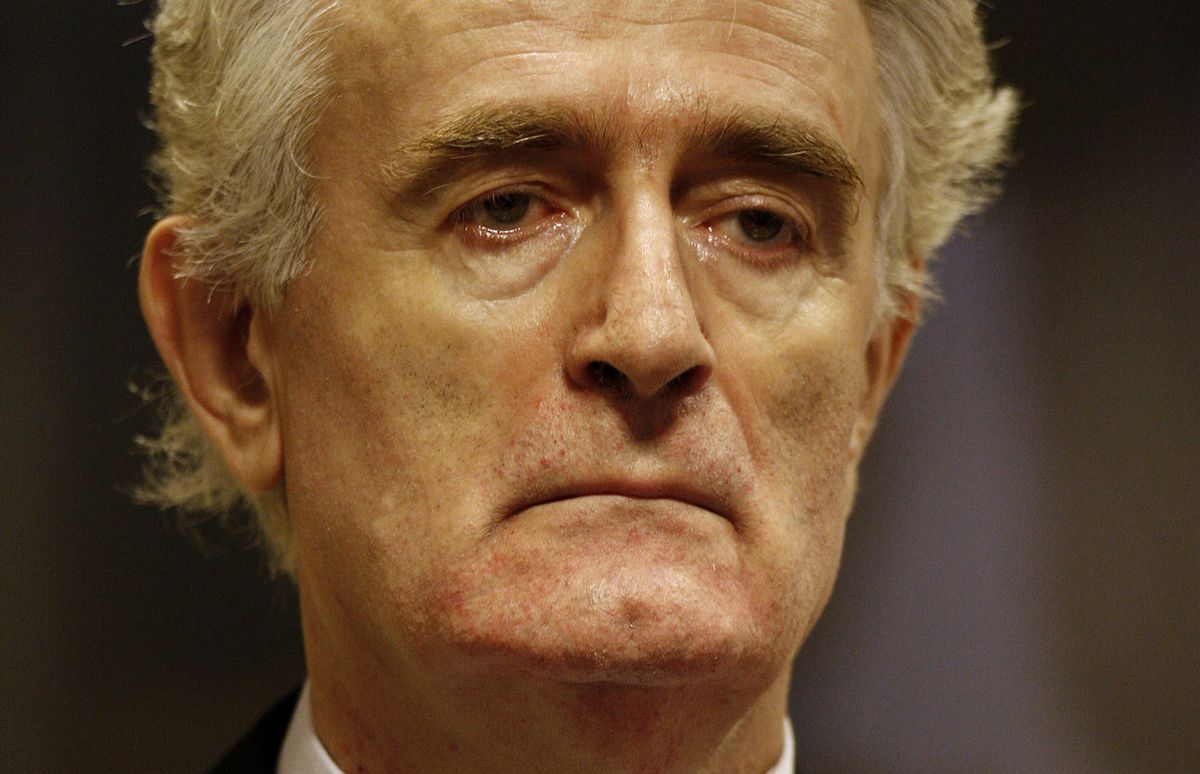Karadzic appears in U.N. war crimes court
Former Serb leader says he’ll defend self

THE HAGUE, Netherlands – Former Bosnian Serb leader Radovan Karadzic had his first skirmishes with the U.N. war crimes tribunal Thursday: He was cut short by the judge when he tried to protest his arrest, and put on notice that the prosecution will object to his demand to represent himself.
During the initial session, Karadzic also claimed his seizure and trial violated a deal he made with the United States in 1996 that the case against him would be scrapped if he left politics and did not undermine the peace agreement that ended the Bosnian war.
Karadzic appeared at a plea hearing one day after he was extradited from Serbia to answer genocide and war crimes charges for the murder of thousands of Bosnian Muslims and Croats and for directing a reign of terror during the 1992-95 Bosnian war.
He declined to enter a plea to the 11 charges against him, and told the judge he intended to act as his own attorney for the duration of the case.
But prosecutor Alan Tieger asked the judge to caution Karadzic about the risks of conducting his own defense – an indication that the prosecution wanted to avoid a repeat of the much-criticized trial of former Yugoslav leader Slobodan Milosevic who died in jail in 2006 before his four-year trial ended.
“With all due respect to you personally, I will defend myself before this institution as I would defend myself before any natural catastrophe,” Karadzic told Judge Alphons Orie.
It was the first time Karadzic was seen in public since he dropped from sight more than a decade ago. He appeared thinner, grayer, but still defiant, self-confident and able to joke.
The full beard, long hair and loose white clothes that he wore when posing as a new age psychologist in Belgrade were replaced by a clean shave, fresh haircut and a business suit with a black briefcase.
“I’ve been in worse places,” he replied with a smile when Orie asked him about conditions at the U.N. jail.
For many war survivors, the sight of Karadzic brought fresh pain to old wounds.
About 20 widows in Tuzla, Bosnia, watched his court appearance on TV in the small office of the Association of the Mothers of Srebrenica, site of a wartime massacre.
“There is the trash,” one woman said when Karadzic came into court. Three women burst into tears.
“I have not found one bone of my children yet and there he is – alive,” said Ramiza Music, 52, who lost two teenage sons, a husband and two brothers at Srebrenica. “Today I feel there is a bit of justice in this otherwise really pitiful world.”
In the Bosnian capital, Sarajevo, coffee bars showed Karadzic’s hearing on giant flat-screen TVs.
“It’s him,” said Elvir Kljakic, 27, who lost his father and brother during the war. “It’s the beast. I did not believe it until now.”
“I’m happy and sad at the same time,” said Alena Tiro, 42. “Happy because the world seems to be not as bad as I thought so far if it forced him to the courtroom. Sad because 100,000 people he killed are not watching this.”
More than 100,000 people were killed during the Bosnian war as part of a campaign to purge the country of non-Serbs.
Though dismissive of the court, Karadzic was respectful, stood at military attention when Orie entered the courtroom and sat motionless as the judge summed up the charges against him.
Orie also cut Karadzic off when he began speaking about a deal he insists he made with U.N. negotiator Richard Holbrooke in 1996, a year after he was indicted by the U.N. court in The Hague.
The judge did not allow him to fully explain his version of events. He said the court would hear those complaints at the right time, but “the appropriate moment is not now.” He suggested Karadzic file a legal submission in writing.
“This is my filing,” Karadzic said, holding out the sheaf of papers at arm’s length.
Orie scheduled a new hearing on Aug. 29 at which Karadzic must enter pleas. If he does not, the court will enter pleas of innocent on his behalf.
But Karadzic’s face showed frustration when Orie refused to let him read a prepared four-page statement outlining “numerous irregularities,” including a claim that he was kidnapped three days before his announced arrest in Belgrade on July 21.